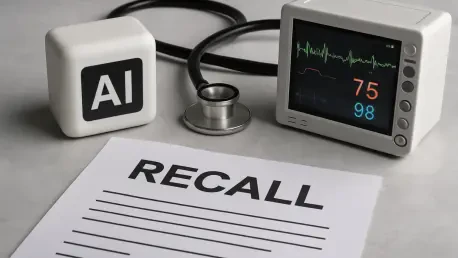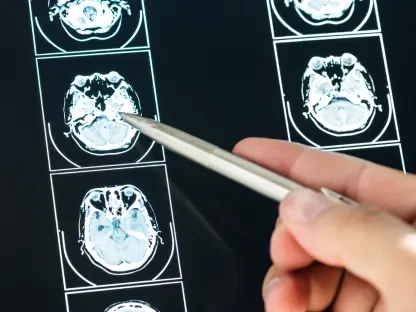Unveiling a Critical Market Challenge
Imagine a cutting-edge AI medical device promising to revolutionize diagnostics, only to be pulled from the market within months due to critical errors endangering patient lives. This scenario is becoming all too common as the rapid integration of artificial intelligence into healthcare outpaces the safeguards meant to ensure safety. A staggering number of recalls linked to unvalidated AI medical devices has raised alarms across the industry, pointing to a systemic issue that could undermine trust in transformative technologies. This market analysis delves into the pressing correlation between insufficient clinical validation and heightened recall risks, exploring current trends, disparities among key players, and future projections for regulatory and corporate responses. By dissecting these dynamics, the aim is to illuminate the path toward balancing innovation with reliability in a sector poised for exponential growth.
Market Trends and Data-Driven Insights
Surge in AI Medical Devices and Rising Recall Incidents
The AI medical device market has witnessed remarkable expansion, with hundreds of new products gaining regulatory clearance annually through pathways designed for speed. These devices span a broad spectrum, from imaging analysis tools to real-time patient monitoring systems, driven by advancements in machine learning algorithms. However, a troubling trend has emerged: a significant portion of these innovations face recalls shortly after market entry due to diagnostic inaccuracies or functional failures. Data from a comprehensive analysis of 950 FDA-authorized devices indicates that 60 were associated with 182 recall events, with 43% of these incidents occurring within the first year of approval. This rapid failure rate signals potential weaknesses in pre-market evaluations, casting a shadow over the market’s growth trajectory.
Validation as a Market Differentiator
Delving deeper into the data, a clear pattern surfaces—devices that undergo rigorous clinical validation, whether through retrospective data studies or prospective human trials, exhibit substantially lower recall rates. This finding positions validation not just as a regulatory checkbox but as a critical market differentiator. Companies investing in thorough testing are likely to gain a competitive edge by minimizing costly recalls and building consumer confidence. Conversely, reliance on expedited clearance processes, which often waive clinical studies, correlates with higher risk, particularly for devices leveraging complex AI algorithms. As market stakeholders grapple with these insights, the push for mandatory validation could reshape investment priorities and product development timelines.
Corporate Disparities Impacting Market Stability
A striking disparity between publicly traded and private companies further complicates the market landscape. Public firms, representing roughly 53% of AI medical devices, account for over 90% of recall events and nearly 99% of recalled units. This imbalance is particularly pronounced among smaller public entities, where 97% of recalled devices lacked validation, compared to 40% for private counterparts. Market pressures, such as the drive to meet shareholder expectations or outpace competitors, appear to incentivize speed over safety in public companies. This corporate divide suggests that structural incentives play a pivotal role in market stability, potentially influencing investor perceptions and long-term growth strategies for firms of varying sizes.
Regulatory Environment and Future Projections
Shortfalls in Current Oversight Mechanisms
The regulatory framework governing AI medical devices, particularly the FDA’s 510(k) clearance pathway, has come under intense scrutiny for its role in recall proliferation. Designed to accelerate market access by allowing devices to demonstrate equivalence to existing products, this process frequently bypasses clinical trials, even for technologies with unique risks. Regional inconsistencies in enforcement and the absence of mandatory post-market data collection exacerbate these gaps, leaving patient safety vulnerable. As the market evolves, the inadequacy of reactive surveillance—relying on post-market fixes rather than preemptive testing—has become a focal point for reform discussions among industry watchdogs and policymakers.
Projected Shifts in Policy and Market Dynamics
Looking ahead, the AI medical device sector is on the cusp of transformative regulatory changes. Draft guidances issued by the FDA signal a move toward stricter oversight of the 510(k) program, with potential mandates for clinical trials gaining traction. Projections suggest that within the next few years, regulators might introduce time-bound clearances, revoking approvals after a set period—possibly five years—if real-world effectiveness data is not provided. Such policies could raise entry barriers, potentially consolidating market share among larger players with the resources to meet enhanced requirements. Simultaneously, innovations in real-world data monitoring are expected to bolster post-market tracking, offering a complementary layer of safety assurance.
Economic Implications and Industry Adaptation
From an economic perspective, the cost of mandatory validation may challenge smaller firms, pushing them to seek partnerships or exit the market altogether. Larger corporations, with deeper financial reserves, are likely to adapt more readily, possibly driving a wave of mergers and acquisitions as consolidation accelerates. Industry projections also highlight a growing demand for transparency, with healthcare providers and end-users increasingly prioritizing validated devices over untested alternatives. This shift could spur a niche market for validation-focused service providers, offering testing solutions to bridge the resource gap for smaller innovators. Over the next few years, these economic undercurrents are expected to redefine competitive dynamics significantly.
Reflecting on Market Insights and Strategic Pathways
Looking back, the analysis of the AI medical device market revealed a critical intersection of innovation and risk, where the absence of clinical validation emerged as a primary driver of recalls. The stark contrast in safety outcomes between public and private companies underscored the influence of corporate incentives on market performance, while regulatory shortfalls highlighted the need for systemic overhaul. Moving forward, strategic pathways became clear: manufacturers need to prioritize pre-market testing and continuous data collection to safeguard against recalls. Regulators must consider enforcing stricter clearance criteria and incentivizing real-world studies to ensure patient safety. For investors and healthcare stakeholders, the emphasis shifts to supporting firms that balance speed with reliability, fostering a market environment where trust and innovation can coexist harmoniously.









